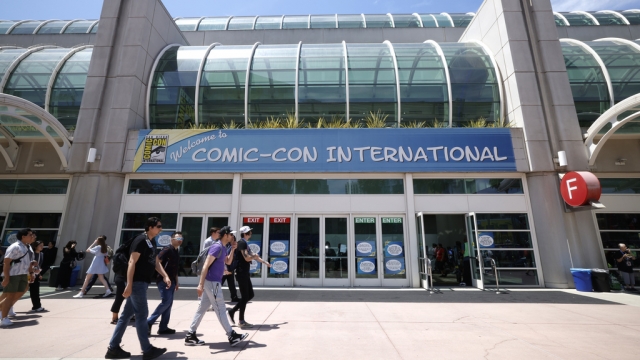At San Diego Comic-Con, fans all across the world come together to celebrate all things nerdy: comic book superheroes, sci-fi and fantasy legends, anime, video games, etc.
This year, those celebrations were coupled with advocacy for the striking writers and actors of Hollywood.
"Having unions and being a part of a union is a massive, massive boon — essential, I would say — to protect against this kind of technology," said Ashly Burch, an actress best known her work on the sitcom "Mythic Quest" and video games like "Horizon Zero Dawn."
At a press conference in front of fandom bloggers and entertainment reporters, members of SAG-AFTRA and the National Association of Voice Actors, or NAVA, explained the worries performers had over the nonconsensual use of artificial intelligence.
"One of the areas where this has been at the forefront has been in deepfakes and the abuse of many of our more high-profile members in just egregious ways by people using deepfake technology," said Duncan Crabtree-Ireland, SAG-AFTRA's national executive director and chief negotiator.
Crabtree-Ireland is referencing the ways AI-generated likenesses and voices have been used in everything from commercials to pornography without actors' knowledge, consent or compensation. Earlier this month, fans of the video game "Skyrim" called out the tech company NexusMods for allowing some users to add pornographic audio lines using AI voice clonings of the game's original actors.
Tim Friedlander, the founder and president of NAVA, says the threat of AI is particularly worrying because of the lack of regulations over how tech companies and studios use artists' work without knowledged consent.
"From the voice actor standpoint, we have been sending our audio files out for 20 years. We've been digitally sending our audio around the world for years. It's very easy to have been picked up and to be used," Friedlander said.
SEE MORE: Hollywood and a history of strikes: How did they turn out?
"What people are saying here really resonates with the public so much because I think everyone is concerned about having elements of their personal life or their persona, maybe their face, taken and used without real informed consent," Crabtree-Ireland said.
This is why both the WGA and SAG-AFTRA are fighting for protections against AI.
In response, the Alliance of Motion Picture and Television Producers issued a statement saying the major studios' offer included a proposal to require consent from actors over "the creation and use of digital replicas."
Netflix Co-CEO Ted Sarandos also recently told investors, "We are constantly at the table negotiating with writers, with directors, with actors, with producers, with everyone across the industry, and we very much hoped to reach an agreement by now."
But Crabtree-Ireland said that proposal would also allow major studios to pay actors one day's pay to own the scans and likenesses of background actors that can then be used in perpetuity.
"If you're going to create a digital replica of a performer for the purpose of reducing vocal stress, that could be discussed. They could know exactly what's going to be done with that digital replica, and that's great," Crabtree-Ireland said. "What's not great is a line that says, 'We're going to create a digital replica of your voice, and we have the right to use it in perpetuity throughout the universe for any purpose we desire. Period.'"
Despite the warnings about the use of AI, Crabtree-Ireland and members of SAG-AFTRA say this ultimately isn't a battle between artists and tech, but instead, it's an ongoing conversation about the way tech is used.
"AI can be implemented in a human-centered way," Crabtree-Ireland said. "AI can be implemented in a way that uplifts people instead of breaking them down, and I really feel like we all — actors and, actually, the entire society — ought to be saying, 'We demand that it is not okay for these companies to just implement this however they want.'"
Trending stories at Scrippsnews.com




